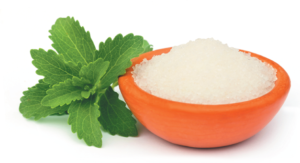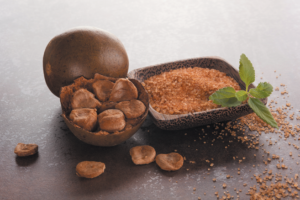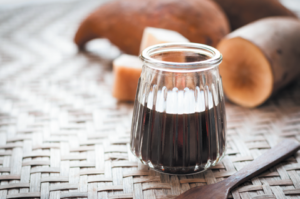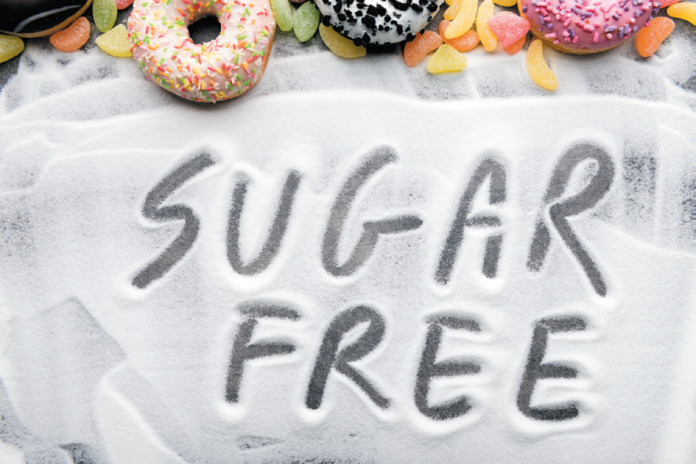Nutrition research is rarely unequivocal, but experts are in agreement on at least one fact: added sugars are bad for our health. Sugar substitutes are used by food manufacturers to try to satisfy our desire for sweets without cavities, calories, and blood-sugar impact. The most recent entries into the “sugar-free” scene are low calorie and calorie-free compounds derived from plants, including stevia, monk fruit extract, and yacon syrup. A closer look at these and other “natural” sugar substitutes may help you determine whether or not they are a good choice for you.
Why Sugar Substitutes? Added sugars are associated with obesity, type 2 diabetes, and cardiovascular disease. They add calories to foods without adding nutritional value and they cause blood sugar (glucose) levels to rise.
Low-calorie and non-caloric sugar substitutes are employed to reduce calorie content of sweet foods in the (unproven) hope this will help with weight management. They are also commonly used, particularly by people with diabetes, to help control blood sugar levels.
Sugar substitutes, which are often much more intensely sweet than sugar, are compounds that cannot be broken down by our digestive systems (or by the bacteria that live in our guts). They therefore do not provide us with any calories, and, since they cannot be converted to glucose, they do not boost blood sugar levels.

Steviol glycosides are extracted from the leaves of the stevia plant, which have been recognized for their sweet taste in South America for centuries. Although concerns about potential toxicity have been raised regarding stevia leaves and crude extracts, highly purified extracts have been judged to be safe by the U.S. Food and Drug Administration (FDA), which has approved their use in foods since 2008. The World Health Organization has also determined purified steviol glycosides to be safe, up to 4 milligrams per kilogram of body weight per day. For an individual weighing around 150 pounds, that’s about 280 mg—or around 10 single serving packets of stevia products—a day.
A randomized controlled trial in healthy subjects found that participants given a snack food with purified steviol glycosides 20 minutes before a meal had significantly lower blood sugar rises after meals compared to those consuming the same snack sweetened with sugar. Participants did not compensate by eating more at meals and reported similar feelings of fullness and satisfaction with the stevia- versus sugar-sweetened snack. In contrast, a similar trial using stevia in beverages found that the lower calories consumed from the stevia (vs. sugar) drink were completely offset by eating more food at later meals. These conflicting results mean more research is needed to understand whether using stevia extracts reduces overall calorie intake.
Purified steviol glycosides are used as a noncaloric natural sweetener in low-calorie or calorie-free beverages and other “diet” foods, and several forms are available for home use, including products mixing stevia extracts with other sweeteners. Stevia can have a bitter aftertaste and may not be suitable for all uses. Per gram, stevia is 200 times sweeter than sucrose (table sugar), so much less is needed to achieve the same level of sweetness. Check manufacturer’s instructions for uses and substitution recommendations.
Some sugar substitutes are man-made artificial sweeteners, but many are compounds found in nature that are extracted, isolated, and added to foods or beverages in small quantities to increase the perception of sweetness. Although the extraction process sometimes makes these “natural” sugar substitutes somewhat distant from their source in nature, these products are appealing to many consumers looking for nature-based products that will sweeten their foods without the associated calories or spikes in blood sugar.

The monk fruit plant, luo han guo, is native to southern China and northern Thailand. The plant contains compounds called mogrosides which can be extracted from the fruit and purified. These compounds are 100 to 250 times sweeter per gram than sucrose. Like steviol glycosides, monk fruit sweetener is considered by the FDA to be Generally Recognized as Safe (GRAS), meaning it can be used as an ingredient in foods and drinks. It is also available as a component of sweetener blends or as a stand-alone sweetener.
Although mogrosides are phytochemicals with antioxidant and anti-inflammatory potential, it’s not clear they provide any health benefits that can’t be achieved by eating a plant-rich, healthy dietary pattern. Research on monk fruit sweetener’s potential impact on weight and blood sugar is limited.
What to Do. “If you’re going to drink or eat something with a lot of added sugars, it’s pretty likely that low- or no-calorie natural sweeteners are better alternatives,” says Dariush Mozaffarian, MD, DrPh, dean of the Friedman School and editor-in-chief of Tufts Health & Nutrition Letter. “But remember that such drinks and foods can be unhealthy in other ways, so don’t allow lower calories to give a food a false aura of health.”
The best choice is to wean ourselves off the need for intense sweet tastes in general. On the way there, the no- or low-sugar plant-based sweeteners listed here might bring a little sweetness to your life with less worry of negative health effects.
Allulose is around 70 percent as sweet as sucrose, but with 10 percent of the calories. It has no bitter aftertaste, and browns like sugar, so baked goods made with allulose instead of sugar will have a similar color and taste. You may also find allulose used in beverages, candy, frozen confections, and dairy.
Some human trials report allulose causes less rise in blood sugar after a meal compared to regular sugar in healthy subjects and in people with pre-diabetes. Claims that allulose has cholesterol-lowering and anti-inflammatory effects are based primarily on animal studies. In one study, young healthy adults who weighed an average of 150 pounds started experiencing diarrhea, bloating, and belly pain after eating about 28 grams per day (about seven teaspoons) of pure allulose.
- Cut down. Work on eating less pre-sweetened foods and beverages in general. Naturally sweet foods like fruit are good for your health, but beverages and foods with high levels of added sugars increase risk of weight gain, diabetes, and dental caries (cavities).
Consider natural sugar substitutes. When you do want a sweet treat, natural sugar substitutes like stevia, monk fruit extract, yacon syrup, allulose, and sugar alcohols may be an option worth trying, especially if you have diabetes. Each of these options has different pros and cons. - Don’t overdo it. Some natural sugar substitutes can cause gastrointestinal
distress at high doses, so don’t eat too much, particularly of any one type. - Read labels. Sweet products labeled “diet,” “lite,” “low-calorie,” or “sugar free” likely have either artificial or natural sugar substitutes. Check ingredient lists for more information. For home use, some sugar substitutes are sold as stand-alone products, but many are mixed with sugars or other ingredients to improve taste or usefulness.
- Follow instructions. Most sugar substitutes do not replace sugar in a one-to-one ratio, and not all are suitable for cooking or baking, so read recommendations and substitution instructions on packaging.

Newer to the U.S. sweetener scene, but growing in availability, yacon syrup is extracted from the roots, or tubers, of the yacón plant native to South America. This sweet, dark syrup is similar in consistency to molasses.
Because yacon syrup is made by filtering and evaporating the juice from the roots, some consider it less processed than Stevia or monk fruit extracts. The syrup contains sugars but is also rich in fructooligosaccharides, or FOS. FOS are mildly sweet but are also a dietary fiber (not broken down during digestion). Because of this, yacon syrup is about 75 percent as sweet as table sugar, but has only one-third the calories and is less likely to cause spikes in blood sugar. FOS (also found in foods like onions, garlic, asparagus, bananas, and artichokes) are considered prebiotics—types of dietary fiber that feed the beneficial bacteria in your gut.
Evidence from studies in humans on the health impacts of yacon syrup itself are currently limited. Yacon syrup is generally considered safe for health, and FOS are classified as GRAS by the FDA. If eaten in large quantities, the fermentable fibers can lead to digestive discomfort like bloating, diarrhea, and nausea. Some studies suggest limiting yacon syrup to 10 grams (about two teaspoons) a day.
Sugar alcohols increase blood sugar levels, but less so than sugars. They have been used for many years in sugar-free products, in foods marketed to individuals with diabetes, and in products developed for low carbohydrate eating plans. They are likely to be found in hard candy and cough drops, baked goods, ice cream, and some sugar-free chocolate products. The sugar alcohol erythritol is often chosen for baking mixes and baked goods for its ability to brown like sugar. Certain sugar alcohols, such as xylitol, erythritol, and sorbitol, are favored for use in chewing gum because, unlike sugars, the bacteria in the mouth can’t metabolize them to produce acids that erode teeth.
Large amounts of sugar alcohols are known to cause gastrointestinal problems, including gas and diarrhea. Individual tolerance is highly variable.
























